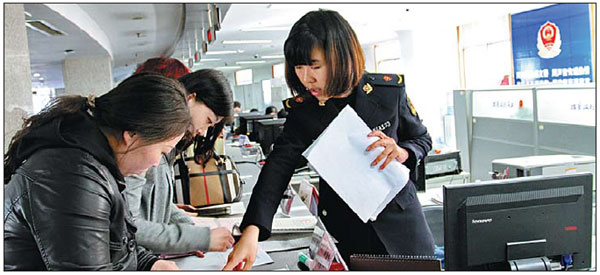Financial reforms reap solid returns
Shandong province is proving its dedication to reforming its investment and financing systems to unleash the potential of its economy.
Statistics from the Shandong provincial financial affairs office show the added value of the Shandong financial sector reached 269.25 billion yuan ($42.9 billion) in 2014, a year-on-year increase of 10.9 percent.
The financial sector contributed 4.5 percent to the province's GDP, 0.36 percentage points higher than in the previous year.
Social financing in the province reached 929.2 billion yuan last year, and was ranked fourth in the country.
According to the guideline for financial reform, which was announced in August 2013, the added value of the Shandong financial sector is expected to constitute 5.5 percent of local GDP and account for 12 percent of the output value of the service industry by the end of 2017.
Since the guideline was announced, only two months after Guo Shuqing, the former chairman of the China Securities Regulatory Commission, was appointed Shandong governor, the province has sped up its efforts on financial reform.
The province streamlines the administrative process to help startups turn their ideas into reality, Qin Ke, deputy head of the Shandong commission of development and reform, said last month.
Last year, the provincial government abolished or delegated to lower levels 170 items requiring administrative examination and approval, according to the government work report delivered by Guo Shuqing at the annual session of the local legislature on January 27.
Guo said the province would further streamline and delegate its administrative approvals and reviews this year.
Shandong's industrial and commercial authorities have set their sights on changing the business licensing procedures by relaxing the examination and approval procedures to make it easier for new players to enter the market.
"But we will tighten supervision at the same time," said Wang Yong, an official at Shandong's administration for industry and commerce.
The number of businesses registered in Shandong has soared thanks to the province's efforts on streamlining its administrative process.
Nearly 707,000 companies registered between January and September last year, a year-on-year increase of 49.4 percent. Total registered capital increased 105.7 percent year-on-year to reach 805.92 billion yuan.
The province also encourages market players to invest in sectors such as infrastructure, public service, resource development and ecological construction via methods including build-transfer, build-operate-transfer and public-private partnerships.
"Private capital has become an engine driving the local economy," said Li Yonghong, spokesman for the Shandong commission of development and reform.
For example, of 290 sewage treatment plants that had been built in the province by the end of 2014, 209 were developed using build-operate-transfer and transfer-operate-transfer models, Li said.
According to the guideline for the province's sewage and garbage treatment construction during the 12th Five-Year Plan (2011-15), the province needs to build new plants that can treat 600,000 tons of sewage per day this year, presenting huge opportunity for private and foreign capital.
Shandong has made sound explorations in the area of direct financing.
Last year, Shandong issued 364 bonds, double the amount issued in the previous year.
These bonds collected 347.65 billion yuan worth of capital, a year-on-year increase of 85.3 percent.
"The capital collected from bonds is playing an important role in upgrading Shandong's economic structure," Qin said. Shandong now has 240 companies listed on domestic stock markets, bringing its combined stock financing to 12.3 billion yuan.
Zhaoruixue@chinadaily.com.cn
|
Precedures are streamlined to make it easier for players entering the market at Jinan administrative examination and approval center. Ju Chuanjiang / China Daily |
(China Daily 03/06/2015 page15)









